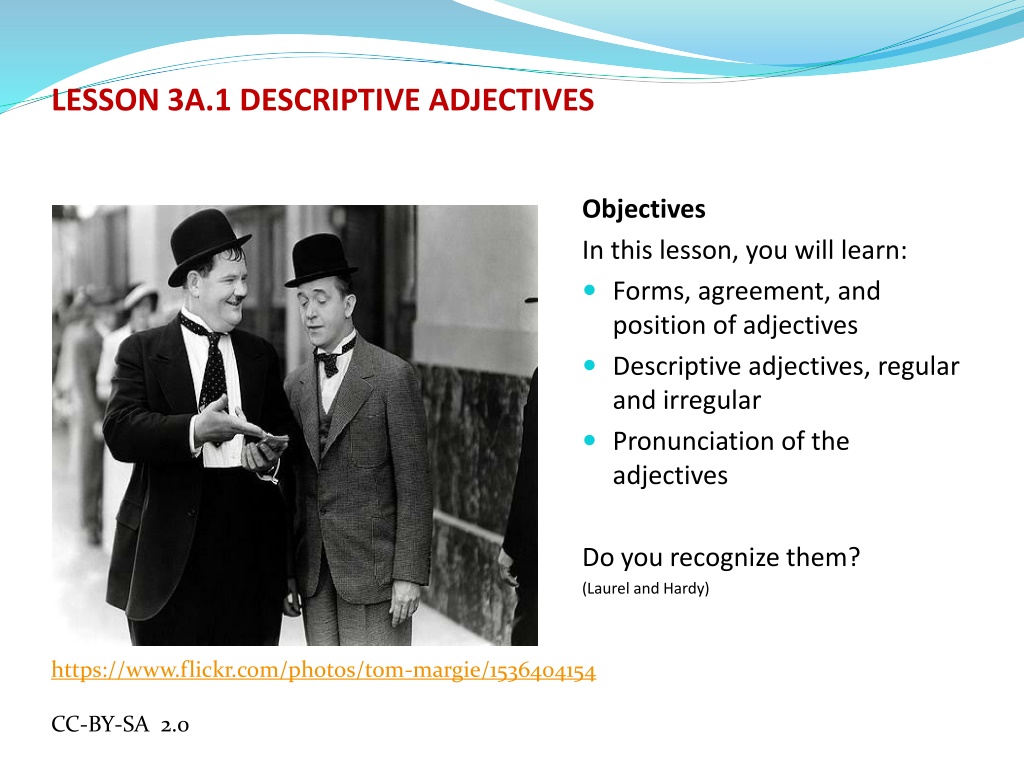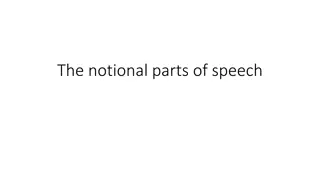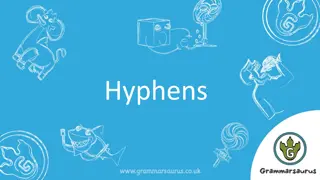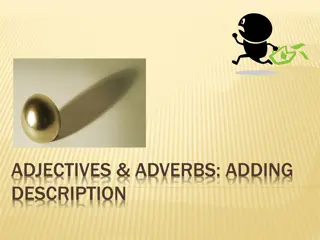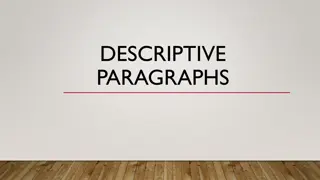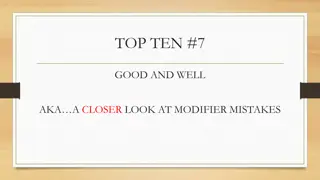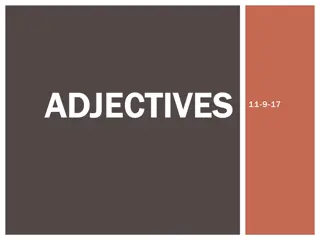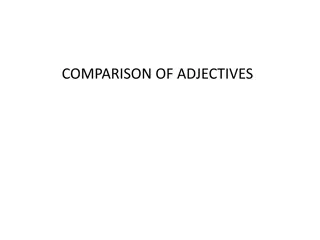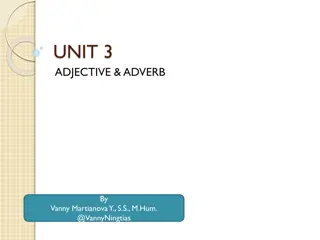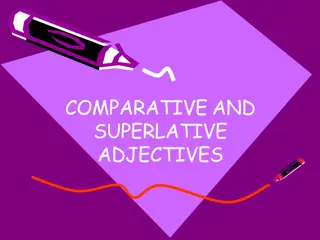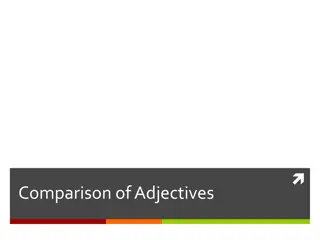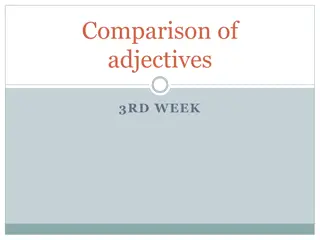Learning Descriptive Adjectives: Forms, Agreement, and Position
This lesson covers the forms, agreement, and position of descriptive adjectives, including regular and irregular adjectives. You will learn about the pronunciation of adjectives and their usage with examples. Understanding the agreement of adjectives with nouns in gender and number is essential. Practice and exposure to these adjectives will help you memorize and use them correctly. Remember the mnemonic device for remembering adjective placement and gender variations.
Download Presentation

Please find below an Image/Link to download the presentation.
The content on the website is provided AS IS for your information and personal use only. It may not be sold, licensed, or shared on other websites without obtaining consent from the author. Download presentation by click this link. If you encounter any issues during the download, it is possible that the publisher has removed the file from their server.
E N D
Presentation Transcript
LESSON 3A.1 DESCRIPTIVE ADJECTIVES Objectives In this lesson, you will learn: Forms, agreement, and position of adjectives Descriptive adjectives, regular and irregular Pronunciation of the adjectives Do you recognize them? (Laurel and Hardy) https://www.flickr.com/photos/tom-margie/1536404154 CC-BY-SA 2.0
OVERVIEW This lesson introduces you to the most common adjectives. There are regular and irregular adjectives For regular adjectives, as you know, you just add the E to form the feminine: blond-e/ petit-e. Irregular adjectives have different endings for masculine and feminine (see next slide). Some adjectives remain the same in the masculine and feminine forms: ch tain/ jeune/ marron/ raide The following adjectives describe people s size: Grand (big), de taille moyenne (medium size) petit (Ex. Jeanne est petite)
OVERVIEW Irregular adjectives These are adjectives that have some other changes, besides adding an E to the feminine form. These changes may even be an accent (fier/ fi re), a double consonant (intelectuel/ intelectuelle), etc. These are the adjectives you are going to use regularly from now on. Make sure you go through the practices and assignments. Constant practice and exposure to these adjectives is the best way to learn and memorize them. Remember: Adjectives must agree with the noun in gender and number Les filles sont belles Les gar ons sont beaux Ma tante est heureuse/ Mon oncle est heureux
OVERVIEW Other important details: Some adjectives are usually placed before the noun: Elle a des bons amis (She has good friends) Il habite dans un grand appartement (He lives in a big building) Here's a pneumonic device to help you remember these adjectives: B (as in Beauty) for joli, beau) A (as in Age) for jeune, vieux and nouveau G (as in Goodness) for bon, mauvais, pauvre S (as in Size) for grand, petit, long and gros Notice the changes before a singular noun that begins with a vowel: belappartement (instead of beau appartement) Nouvelappartement (instead of nouveau appartement) Vieilappartement (instead of vieux appartement) Changes with the plural article DES (some) Un ami sympathique/ Des amis sympathiques
Examples 1. Regular adjectives 1. Elle est curieuse aussi 2. Il est blond aussi 3. elles sont grosses aussi 4. Il est fier et heureux aussi 5. Elle est vieille aussi 2: Adjectives before a noun: 1. Elle a des amies sympatiques 2. Elle habite dans un nouvel appartement 3. Son mari a un bon travail 4. Ses filles sont des tudiantes s rieuses 5. Christine est une femme heureuse 10. Ses voisins sont polis 6. Elle est laide aussi 7. Ils sont intellectuels aussi 8. Ils sont na fs aussi 9. Ils sont beaux aussi 10. Il est roux aussi 6. Son mari est un bel homme 7. Elle a des coll gues amusants 8. Sa secr taire est une jeune fille amusante 9. Elle a des bons chiens
PRACTICE Les accords: Complete each sentence with the correct form of the adjective in parenthesis: (answers below) 1. Ma (my) soeur est__________(grand) et elle a les cheveux_________(roux) 2. Mon cousin Chan a les cheveux________(brun) et___________(court) 3. Nathalie est_________(joli). Elle n est pas_________( laid) 4. Mon cousin est__________(na f). Il n est pas___________(vieux) 5. Ma soeur est________(fier). Son fils est____________(beau) 6. Le__________(nouveau) tudiant est______________(curieux) 7. Les tudiants sont____________(brillant) et____________(s rieux) 8. Moi, j ai les yeux (eyes)__________(bleu). Je suis____________(sociable) Answers: 1. grande/ roux 2. bruns/ courts 3. jolie/ laide 4. na f/ vieux 5. fi re /beau 6. nouvel/ curieux 7. brillants/s rieux 8. bleus/ sociable CC-BY Roger Celis
